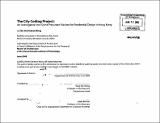| dc.contributor.advisor | Yung Ho Chang. | en_US |
| dc.contributor.author | Wong, Chit Kin Dickson | en_US |
| dc.contributor.other | Massachusetts Institute of Technology. Dept. of Architecture. | en_US |
| dc.coverage.spatial | a-cc-hk | en_US |
| dc.date.accessioned | 2008-12-11T18:37:06Z | |
| dc.date.available | 2008-12-11T18:37:06Z | |
| dc.date.copyright | 2008 | en_US |
| dc.date.issued | 2008 | en_US |
| dc.identifier.uri | http://hdl.handle.net/1721.1/43842 | |
| dc.description | Thesis (M. Arch.)--Massachusetts Institute of Technology, Dept. of Architecture, 2008. | en_US |
| dc.description | Includes bibliographical references (p. 72). | en_US |
| dc.description.abstract | Formal expressions of architecture in a city are largely dictated by how the city is 'coded' ... re-coding - is capable of making fundamental changes in building forms that would proliferate across the entire city. Therefore, the City Coding Project consists of two primary components: * Through the study of how residential developments in Hong Kong are 'coded' the first part of this thesis seeks to understand the underlying logic of the city's zoning regulations, programming conventions, construction practices and building codes in order to earn one degree of freedom that would alter the city's form fundamentally. * Having that in mind, the second part of this thesis shows how, through creatively accepting, adding or tampering with the city's existing ge-nomes, new formal potentials within the domain of existing practices could be unleashed and manifested as a new architectural typology. These new formal potentials are particularly pertinent to residential design in Hong Kong be code-driven solutions to the problems of extreme density, mixed-use programming and cc tions is a - formally as well as programmatically - highly monotonous urban Iandscape.The ( a prototypical undertaking that demonstrates how one could wriggle free from - but not cor able constraints upon residential design. keywords: building codes, construction practices, mass production, mass customization, amenity programs. | en_US |
| dc.description.statementofresponsibility | by Chit Kin Diclson Wong. | en_US |
| dc.format.extent | 73 p. | en_US |
| dc.language.iso | eng | en_US |
| dc.publisher | Massachusetts Institute of Technology | en_US |
| dc.rights | M.I.T. theses are protected by
copyright. They may be viewed from this source for any purpose, but
reproduction or distribution in any format is prohibited without written
permission. See provided URL for inquiries about permission. | en_US |
| dc.rights.uri | http://dspace.mit.edu/handle/1721.1/7582 | en_US |
| dc.subject | Architecture. | en_US |
| dc.title | The City Coding Project : an investigation into some presumed maxims for residential design in Hong Kong | en_US |
| dc.title.alternative | Investigation into some presumed maxims for residential design in Hong Kong | en_US |
| dc.type | Thesis | en_US |
| dc.description.degree | M.Arch. | en_US |
| dc.contributor.department | Massachusetts Institute of Technology. Department of Architecture | |
| dc.identifier.oclc | 262987021 | en_US |
